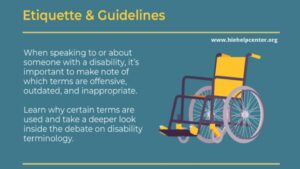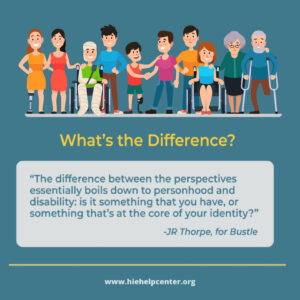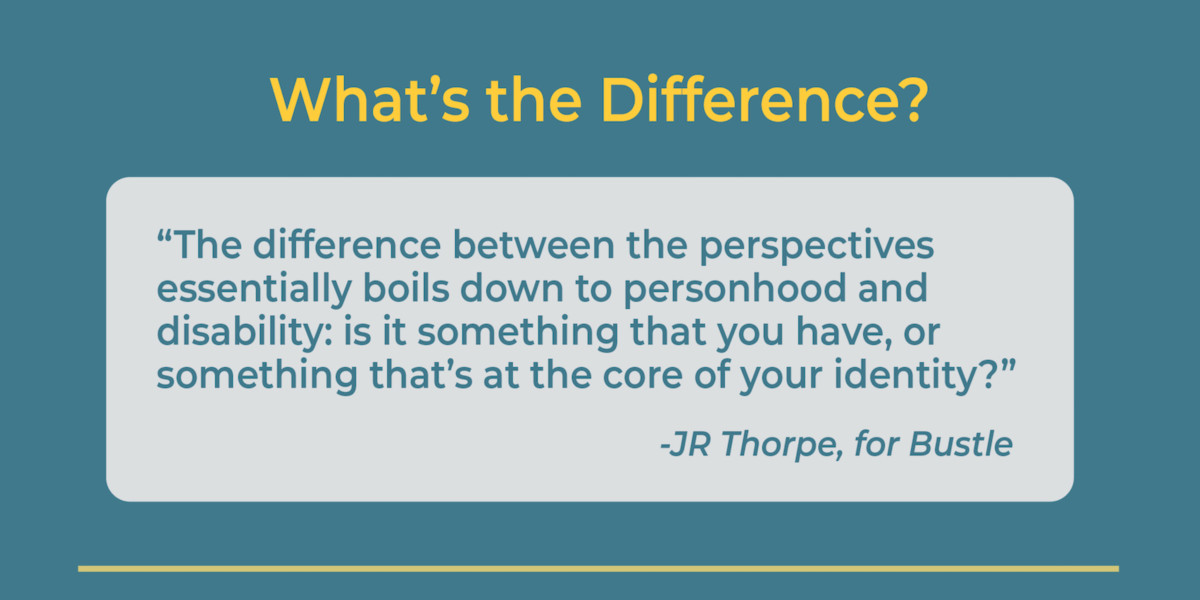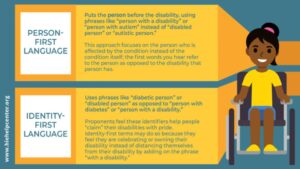 When speaking to or about someone with a disability, it’s important to make note of which terms are offensive, outdated, and inappropriate. Throughout this page, we’ll unpack why certain terms are used and take a deeper look inside the debate on disability terminology.
When speaking to or about someone with a disability, it’s important to make note of which terms are offensive, outdated, and inappropriate. Throughout this page, we’ll unpack why certain terms are used and take a deeper look inside the debate on disability terminology.
Different Schools of Thought
Person-first language
Many institutions, including The American Psychological Association (APA), promote what is referred to as “person-first language” when it comes to talking about people with disabilities (1). Person-first language puts the person before the disability, using phrases like “person with a disability” or “person with autism” instead of “disabled person” or “autistic person.” Advocates of this approach state that it focuses on the person who is affected by the condition instead of the condition itself; the first words you hear refer to the person as opposed to the disability that person has.
Identity-first language
Other institutions, like The National Federation of the Blind, use identity-first language when speaking of disabilities. This means they use phrases like “diabetic person” or “disabled person” as opposed to “person with diabetes” or “person with a disability.” They use these identifiers because they feel it helps those people to “claim” their disabilities with pride. People who refer to themselves using identity-first terms may do so because they feel they are celebrating or owning their disability instead of distancing themselves from their disability by adding on the phrase “with a disability.”
What’s the difference between identity-first and person-first language?
 According to JR Thorpe, in a piece for Bustle, “the difference between the perspectives essentially boils down to personhood and disability: is it something that you have, or something that’s at the core of your identity?” (2).
According to JR Thorpe, in a piece for Bustle, “the difference between the perspectives essentially boils down to personhood and disability: is it something that you have, or something that’s at the core of your identity?” (2).
If you feel your disability is an integral part of who you are, you may want someone to use identity-first language. Or if you feel your disability isn’t as important as who you are as a person, you may prefer others to use person-first language.
If you regularly interact with a person in the disability community, it may be a good idea to inquire about their individual preference and use that going forward. This way you can better communicate with them. Both approaches respect disabled people, so either choice will typically work when talking or writing about disabilities.
Agreements in disability terminology
Both schools of thought agree on a few general guidelines for terminology when referring to disabilities:
Avoid pejorative language
Across the board, people with disabilities generally agree that words implying the person is a victim of their disability should be avoided. For example, it is recommended that people choose phrases like “they had a stroke” instead of “they are a stroke victim” or “they suffered a stroke.” These negative phrases can imply that the person is passive to their condition.
Know when praise is patronizing
Excessively praising a person with a disability can be insulting because it implies that you have low expectations of them. For example, calling someone a “hero” or an “inspiration,” though it may seem complimentary, can sound condescending to a person who is simply trying to live their life just like anybody else. Of course, praise is still warranted for remarkable accomplishments, just as it would be for a person without disabilities. However, it may be inappropriate to praise someone for, say, navigating public transportation in a wheelchair. Yes, it is a challenge, but it may also be part of their daily life and something they are accustomed to. According to Erin Tatum, in her piece for Everyday Feminism, “If people fixate on how inhibited they think disabled people are, the emphasis shifts to our obstacles rather than our achievements” (3).
Disability terminology in practice
Here is how these terms work in practice, according to The National Disability Authority and The National Center on Disability and Journalism:
| Person-First | Identity-First | Not Recommended |
| person with a disability | disabled person | the disabled, cripple, victim, spastic, spaz, handicapped, the handicapped, abnormal, dumb/deaf-mute, defect, defective, midget, or vegetable |
| person with an intellectual disability | intellectually-disabled person | mental handicap, mentally retarded, or mentally handicapped |
| person with a mental health disability | mentally-disabled person | mad, crazy, schizo, schizophrenic, insane, nuts, psycho, psychotic, demented, senile, loony, or lunatic |
| person who uses a wheelchair | wheelchair user | wheelchair-bound or confined to a wheelchair |
| has… (diagnosis) | adjective form of diagnosis (i.e. ‘autistic’) person | suffers from… afflicted with… stricken with… or victim of… |
| person without a disability | not disabled or non-disabled | normal |
Related Resources:
Sources:
- Choosing Words for Talking About Disability. (n.d.). Retrieved September 17, 2018, from https://www.apa.org/pi/disability/resources/choosing-words.aspx
- Thorpe, J. (2018, August 24). This Is How To Talk About Disability, According To Disabled People. Retrieved September 17, 2018, from https://www.bustle.com/p/what-is-identity-first-language-should-you-use-it-74901
- Tatum, E. (2017, February 02). 7 Reasons to Stop Calling Disabled People Inspirational. Retrieved September 17, 2018, from https://everydayfeminism.com/2015/04/stop-calling-disabled-people-inspirational/
- Wynn, S. (2017, October 17). Please stop spreading “inspiration porn” about disability. Retrieved February 26th, 2024, from https://themighty.com/topic/disability/please-stop-spreading-inspiration-porn-about-disability/
- Appropriate Terms to Use. (n.d.). Retrieved September 17, 2018, from https://nda.ie/Publications/Attitudes/Appropriate-Terms-to-Use-about-Disability/
- B. (n.d.). Terms to Avoid When Writing About Disability. Retrieved September 17, 2018, from https://ncdj.org/2015/09/terms-to-avoid-when-writing-about-disability/



Leave a Reply
You must be logged in to post a comment.